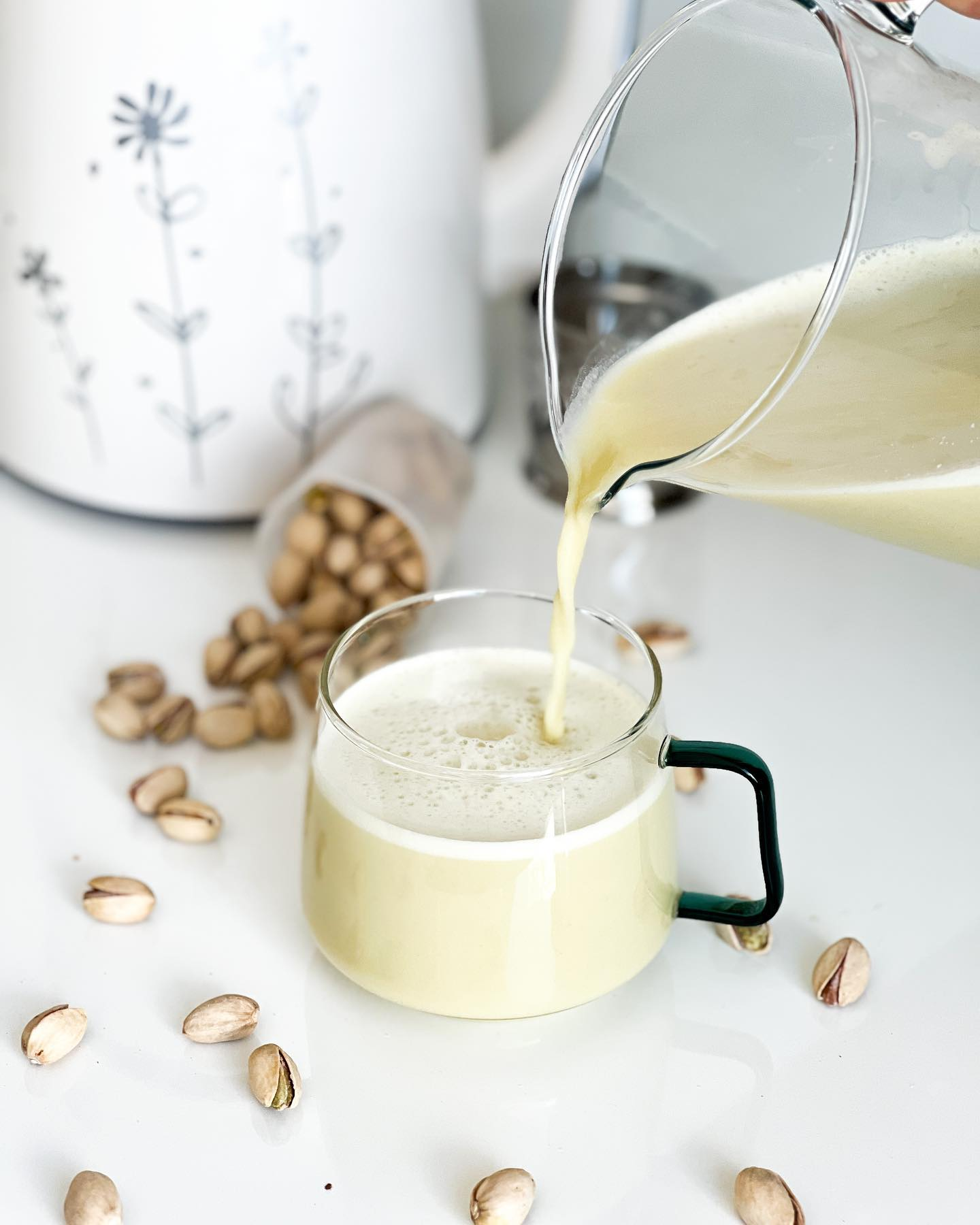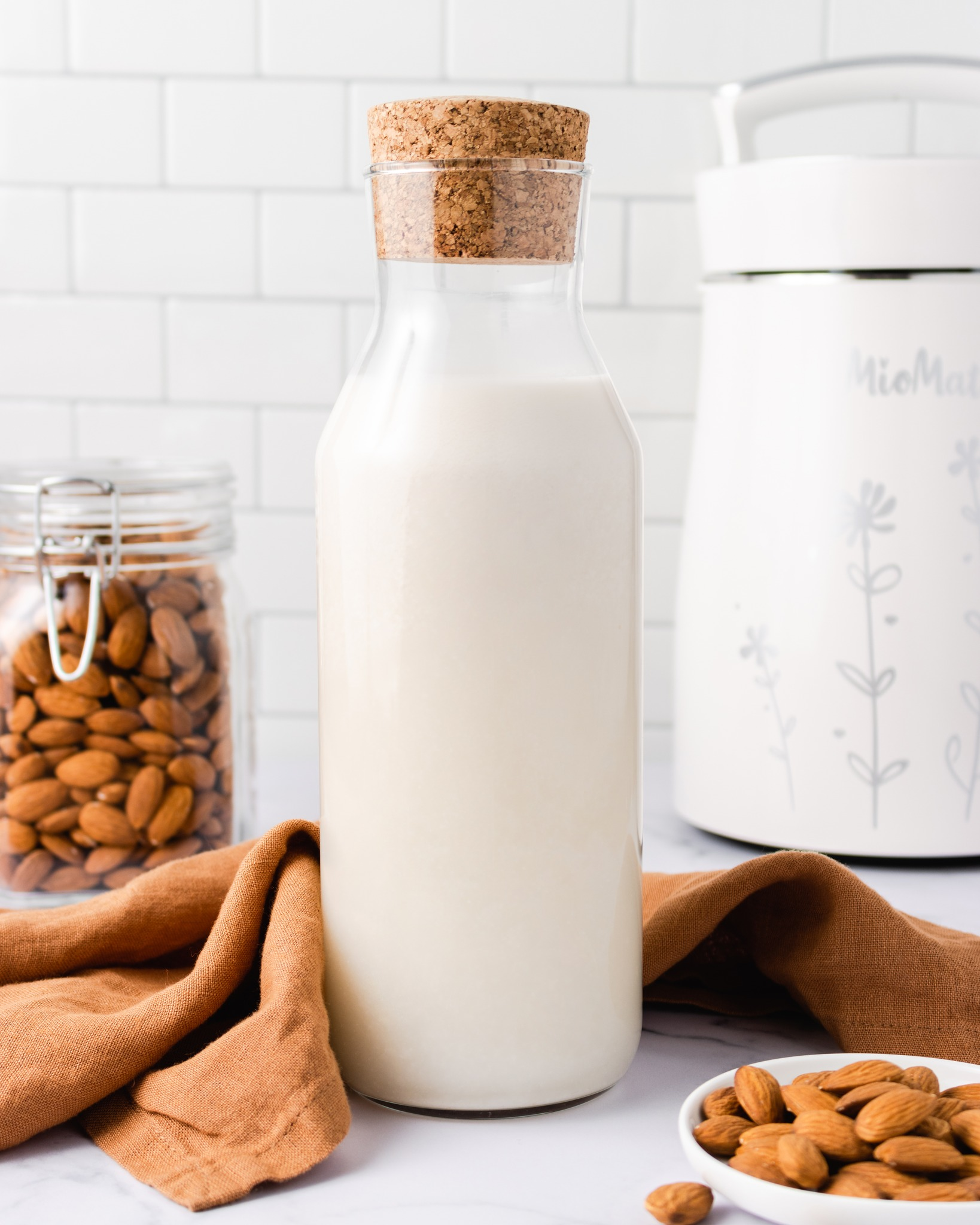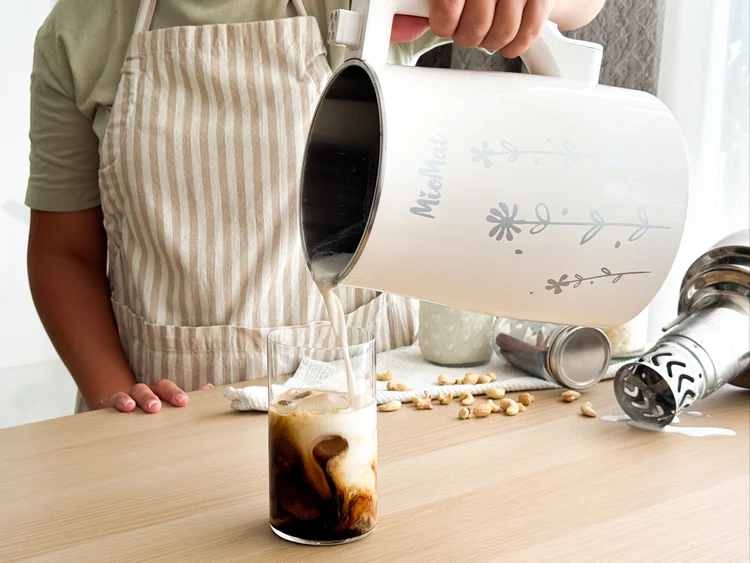Glass jar of fresh homemade plant milk on a wooden countertop surrounded by almonds, oats, and cashews, bathed in soft natural light. Making plant milk with a MioMat is not only delicious but also healthier than store-bought options. Unlike commercial alternatives, homemade plant milk doesn’t contain any additives, preservatives, or artificial sweeteners. It’s a pure and natural source of nutrients, making it a better choice for your overall health.
Why You Should Think Twice About Store-Bought Plant Milks with MioMat
Plant-based milks have become a symbol of healthy living. Grocery stores are packed with almond, oat, soy, and cashew varieties, each promising wellness and sustainability. Yet behind the glossy packaging and “all-natural” claims, most commercial plant milks are far from the clean, wholesome beverages people expect. These products often contain additives such as stabilizers, emulsifiers, and synthetic vitamins to enhance their flavor and texture. Some brands even use carrageenan, a controversial ingredient known to cause digestive issues in certain individuals. Additionally, many store-bought plant milks are fortified with nutrients that may not be effectively absorbed by the body.
While they seem like healthy dairy alternatives, store-bought plant milks are often loaded with additives, gums, preservatives, and synthetic nutrients—ingredients that can do more harm than good over time. Understanding what’s really in that carton can help you make more informed choices about what you drink every day. Consider using a MioMat to prepare your own plant milks at home, ensuring that you know exactly what goes into them.
The Hidden Dangers in Commercial Plant Milks
Pick up any carton of almond or oat milk and read the ingredient label. Beyond the base ingredient, you’ll find a list of chemicals and fillers. These additives serve manufacturers’ needs—extending shelf life, improving texture, and reducing costs—but they compromise the nutritional integrity of the final product. These additives serve manufacturers’ needs—extending shelf life, improving texture, and reducing costs—but they compromise the nutritional integrity of the final product. Synthetic vitamins may not be as easily absorbed or utilized by the body as those obtained from whole foods. Carrageenan, a common additive used in plant milks, has been linked to inflammation and digestive issues in certain individuals. Moreover, the environmental impact of large-scale plant milk production is often underestimated. The water, land, and energy required to grow and process these crops can have significant ecological consequences. So while plant-based milks may seem like a healthy and sustainable alternative, it’s important to scrutinize their ingredients and consider potential trade-offs before making them a staple in your diet.
1. Gums and Thickeners: Smooth Texture, Rough Impact
Additives like carrageenan, gellan gum, and xanthan gum make commercial plant milks thick and creamy. While these ingredients improve shelf stability and mouthfeel, some studies link carrageenan to gut inflammation and digestive discomfort.
Your body doesn’t digest these gums; they pass through without adding nutritional value. For those with sensitive stomachs or IBS, these ingredients can trigger bloating and irritation.
2. Preservatives: Chemical Shelf Life Boosters
Store-bought milks are designed to sit on shelves for months. Preservatives like potassium sorbate and sodium benzoate prevent bacterial growth, but they also add synthetic chemicals to what should be a simple, natural drink.
Over time, regular exposure to these compounds may contribute to oxidative stress and allergic reactions in sensitive individuals. Homemade versions, by contrast, last only a few days—but that freshness is exactly what makes them healthier.
3. Fortification: Synthetic Doesn’t Mean Superior
Manufacturers often add vitamins and minerals such as calcium carbonate, vitamin D2, or B12 to replace nutrients lost during high-heat processing. However, these synthetic nutrients are often less bioavailable—meaning your body absorbs them less efficiently than natural ones.
When you make plant milk at home, nutrients like vitamin E, magnesium, and natural plant enzymes remain intact—delivering real nourishment, not artificial replacements.
4. Emulsifiers and “Natural Flavors”: What Are You Really Drinking?
Many cartons also list emulsifiers, added oils, and natural flavors—vague terms that can hide dozens of undisclosed compounds. “Natural flavors” may come from lab-processed extracts that mimic taste but lack transparency. Added oils increase fat content for creaminess, but they also introduce unnecessary calories and lower the product’s overall purity.
The Nutritional Cost of Ultra-Processing with MioMat

Mass production demands efficiency, not nutrition. To achieve long shelf life, manufacturers use high-heat pasteurization and pressure treatment, destroying fragile compounds like vitamin B, E, and essential fatty acids.
Even the proteins and antioxidants present in nuts and grains break down during industrial processing, leaving a beverage that tastes fine but offers only a fraction of the nutritional benefits of fresh, homemade milk.
When you make your own plant milk, you skip these damaging steps. The result? A drink that retains the full flavor, texture, and nutrients of real food.
The Benefits of Homemade Plant Milks with MioMat
Homemade plant milks are fresher, cleaner, and more customizable. You decide exactly what goes into them—no gums, stabilizers, or preservatives.
Devices like the MioMat plant milk maker simplify the process, transforming soaked nuts, seeds, or grains into creamy, nutrient-dense milk in minutes.
Here’s why making your own is worth it:
- 100% control over ingredients – choose organic, non-GMO nuts or grains
- No additives or preservatives – pure nutrition only
- Better taste and texture – fresh and natural
- Higher nutritional value – enzymes, vitamins, and minerals remain intact
- Eco-friendly – no cartons, plastic bottles, or shipping waste
Before your next grocery run, consider how much fresher, cheaper, and healthier it could be to make your plant milk at home.
MioMat: The Smart Way to Make Fresh Plant Milk
Homemade doesn’t have to mean complicated. The MioMat machine revolutionizes plant milk preparation by automating every step—soaking, grinding, heating, and blending—all in one compact appliance.
🔹 Advanced Grinding Technology
At the core of MioMat’s performance is its stainless steel grinding cylinder, which pulverizes ingredients into ultra-fine particles. This process ensures smooth, silky texture without leftover pulp or grittiness, rivaling even the best commercial products.
🔹 Precise Temperature Control
MioMat uses smart temperature sensors to maintain ideal heat levels for each ingredient:
- Cold mode for raw nut milks that preserve enzymes
- Warm mode for oats and grains
- High-heat mode for soy, to deactivate anti-nutrients
Each program—soy milk, nut/seed milk, grain milk, soup, porridge, and smoothie—is optimized for perfect consistency every time.
🔹 Easy to Use and Clean
With MioMat, you simply add ingredients, fill with water, select a program, and press start. The built-in self-cleaning cycle makes post-use maintenance quick and effortless.
Every batch yields around 1.2 liters of milk—enough for several servings—without mess or strain.
Beyond Milk: More Than One Function
MioMat isn’t just for milk lovers. Its versatility extends to soups, porridges, and smoothies—making it a multifunctional appliance that replaces several kitchen gadgets.
- Soups: Blend and cook creamy or chunky soups in under 30 minutes.
- Porridge: Prepare steel-cut oats, quinoa, or rice porridge perfectly cooked and ready to eat.
- Smoothies: Blend fruits and seeds for fresh, nutrient-packed drinks without extra machines.
This all-in-one solution fits seamlessly into modern kitchens, combining convenience, performance, and health.
Sustainability: Better for You and the Planet
The popularity of store-bought plant milks hides a darker side—environmental strain.
For instance, producing just one almond requires over 1 gallon of water, and large-scale almond farming has contributed to severe drought issues in California.
Then there’s packaging: billions of plant milk cartons end up in landfills each year. Most are made from layered materials that are difficult to recycle. Add in the emissions from transportation and refrigeration, and the eco-friendly image starts to crumble.
Making your own milk with MioMat directly reduces your carbon footprint:
- No packaging waste
- Ability to source organic or local ingredients
- No shipping or warehouse storage emissions
- Less water used (especially with oats or hemp)
Sustainable living begins with small, consistent habits—and fresh homemade milk is one of the simplest steps you can take.
Cost Comparison: Homemade vs. Store-Bought

While a carton of almond milk costs around $4–6, making the same amount at home with MioMat costs less than $1 in ingredients. Over a few months, that price difference covers the cost of the machine itself.
Moreover, homemade milk contains more actual nuts and fewer fillers, making it richer in nutrients per serving. It’s a win for your wallet and your health.Health Benefits: Beyond Plant Milks
The MioMat can do much more than make plant milk. Its versatility allows you to create a range of healthy, homemade alternatives. From creamy nut butters and spreads to refreshing fruit sorbets, the possibilities are endless. By taking control of your ingredients, you can ensure your creations are free from additives and preservatives commonly found in store-bought options. It’s a small change that can have a big impact on your overall well-being.
Tips for Making the Best Homemade Plant Milk
To get the most out of your MioMat (or any plant milk maker), follow these quick tips:
- Use fresh, high-quality ingredients — avoid stale nuts or grains.
- Adjust ratios for desired creaminess (more nuts = thicker milk).
- Add natural sweeteners like dates or maple syrup if desired.
- Store milk in airtight glass bottles for freshness (3–5 days refrigerated).
- Shake before use — natural separation is a sign of purity, not spoilage.
Conclusion: Rethink What’s in Your Carton
The truth is simple: store-bought plant milks aren’t as healthy as you think.
They may be convenient, but they come with a trade-off—additives, lost nutrients, and hidden environmental costs.
By switching to homemade, you reclaim control over your health, save money, and make an eco-friendly choice that aligns with your values.
And with MioMat
, this shift couldn’t be easier. In just minutes, you can enjoy fresh, preservative-free plant milk with all the nutrients nature intended.
Better for you. Better for the planet. Better in every glass.
Check it out here: tasteoria.com

